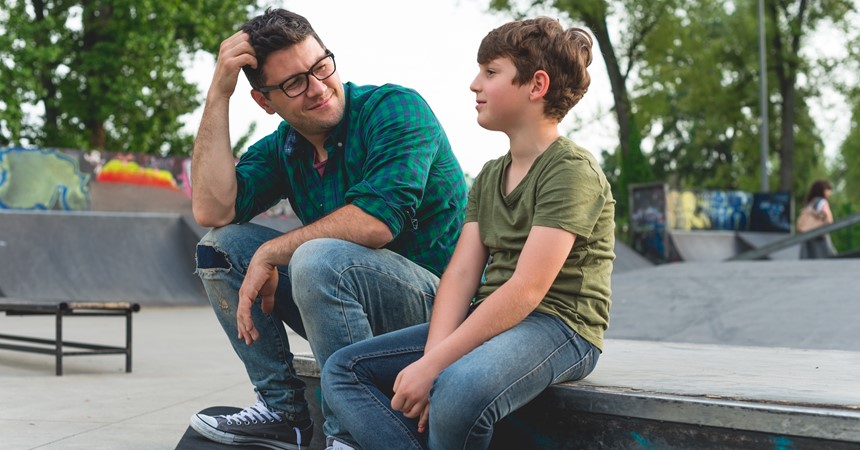Thankfully, we don't wait till they've got tooth decay or skin cancers to introduce these healthy habits. Prevention is always better than a cure.
Our youngsters (mostly) embrace these concepts because we, the adults in their lives, introduce them at a young age and reinforce them through daily conversations and positive role modelling.
And while physical care is and should be a top priority, it's time we adopt the same proactive approach to our children's mental health care.
Why? For starters, research indicates that 24 per cent of school students have a mental health issue.
Compounding this is that suicide is the biggest killer of young Australians.
The time is ripe for us to be empowering the children and young people in our lives with the skills they need to face any of life's challenges that they will come across. It's what will help them bounce back when times are hard. Again, prevention is always better than a cure.
Current statistics show that many young people experience difficulties with emotional regulation, self-regulation, resilience, self-esteem, and anxiety. These difficulties can leave parents and carers wondering how to help them overcome these issues and often feeling helpless.
There are excellent resources available to guide your conversations with children around their wellbeing, which will help them to mature and flourish.
Below are some of my top tips to help you empower your child to thrive and be the best version of themselves.
Take a strength-based parenting approach
One of the world's leading experts on positive education, psychologist and author Lea Waters AM, has undertaken a great deal of research on strength-based parenting (SBP). This approach allows parents to put their children in touch with their specific talents (e.g., physical, mental, creative, technical, or social) and positive personality traits (e.g., capacity for kindness, courage, or love). Ms Waters says, "A strong child is one who can play to his strengths while simultaneously working on his weaknesses". Adopting a SBP approach doesn't mean you ignore weaknesses; it means you view them in a different approach. Address the strengths first e.g., "Sam, I love when you use your strength of fairness when you play with your sister" or "Ellie, I love when you
use your strength of creativity to do your drawings".
Mindful parent, mindful child
Your mindfulness level spills over into your children. How aware are you of your food, surroundings, or mental state in the present moment? Is your mind flooded with thoughts from the past or filled with what is coming up next? Mindfulness is scientifically proven to lower stress levels, anger, and anxiety. It also plays a role in raising positive emotions—the more mindful the parent, the more mindful the child. And the more mindful the child is, the less stressed they will be. I encourage you to to check out the Smiling Mind app. It is a fantastic and free resource that can be easily incorporated into the family routine, particularly before bed. Mindfulness is a wonderful strategy to help your child cope with feelings and challenging emotions.
Gratitude is good for you and your family
Gratitude is all about noticing and actively appreciating all of the good things and moments in your life. Gratitude feels good – when we are appreciated or show appreciation towards others, we feel warm on the inside. Gratitude also helps to build positive and lasting relationships with others. My two favourite family gratitude strategies are 'What Went Well' (WWW) and the 'Gratitude Jar'. The WWW approach involves asking your child to share three good things about their day. This could be done on the drive home from school, at the dinner table or just before they hop into bed. The Gratitude Jar involves you placing an empty jar in the kitchen and asking your family members to put in a note every time they feel grateful for someone else in the family. Read these notes together at Christmas time, before the New Year or simply once the jar is full.
Beware of the negativity bias.
Our brains are wired to be on the lookout for anything that might cause us harm; these are our survival instincts. We see it in our everyday lives; uncomfortable emotions, unpleasant experiences, and hurtful feedback have more impact than 'good' ones. The research says that it takes around seven positive things to counteract one negative. We don't want the negatives consuming us, especially when it comes to raising a child. Remember to practice gratitude and focus on your child's strengths (even in trying times). Attention on the positive helps us to thrive.
Give yourself permission to be human.
It's okay to make mistakes; no parent is perfect. Sometimes our greatest strengths come through our greatest mistakes. Trust that you are on the right path, look for the good, focus on the strengths, model the same behaviours you want your child to display, create an environment where your child feels loved and supported. If you make a mistake, forget something, or lose your temper, own it. Acknowledge what went wrong and reframe your thinking for next time.
Eloise is the Primary Coordinator & Lead Teacher of Positive Education at St James' Primary School, Muswellbrook. As a strength-based parenting facilitator, Eloise is motivated to 'bridge the gap' between home and school. She is driven by the need to engage parents in the wellbeing space to create a common and shared understanding of the power of strengths.




























































































